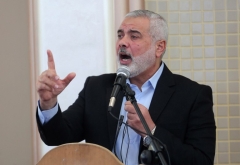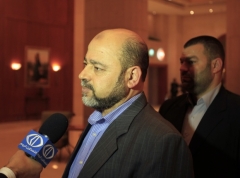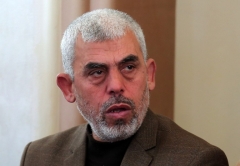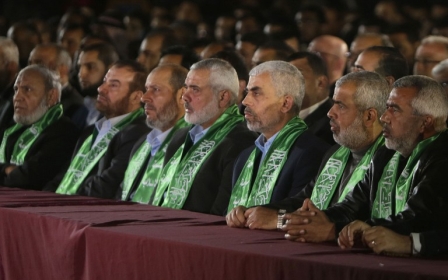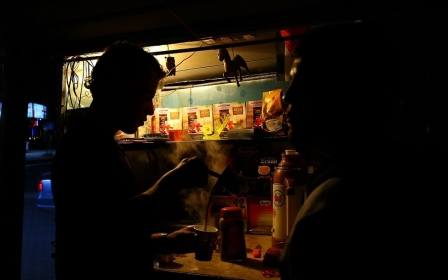Time to bring Hamas in from the cold
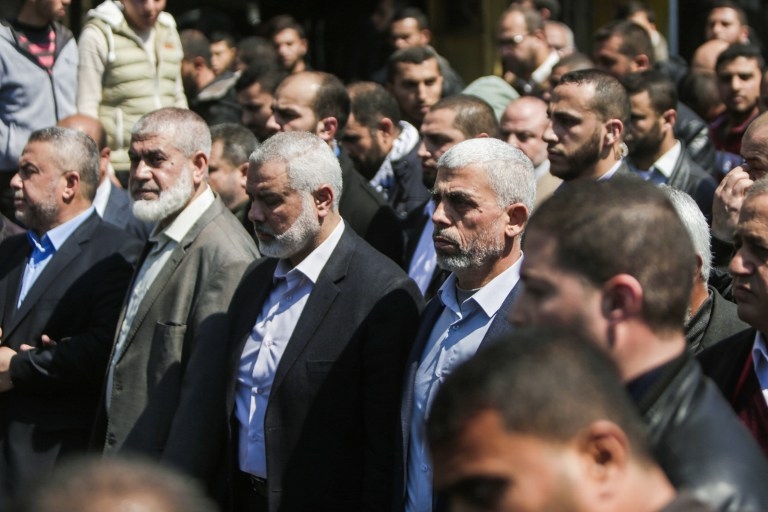
After three years of internal consultations, Hamas’ outgoing Politburo leader, Khaled Meshaal, has now unveiled Hamas’ “Document of General Principles and Policies”, laying out the movement’s policy positions on Israel.
Hamas’s roll-out of the document in English on Twitter was clearly intended to reach international audiences. This marketing campaign reflects the hope among more pragmatic elements within the movement – including Meshaal – that the document can pave the way for engagement with the international community and recognition of Hamas.
Although still far from the political transformation of Hamas that the international community has called for, the unveiling of more pragmatic positions should be cautiously welcomed by the EU and other international actors as a positive step.
Assessing the new platform
Hamas officials presented the platform as a transformative document that sets out new policy positions on Israel and the two-state solution.
The announcement reflects Hamas’s ongoing political evolution rather than an abrupt shift and Meshaal’s attempts to consolidate a more moderate set of policies before his departure
For example, it stresses Hamas’s struggle against Zionism - not the Jewish people - and goes part way towards accepting a two-state solution, noting that “the establishment of a fully sovereign and independent Palestinian state, with Jerusalem as its capital along the lines of the 4th of June 1967, with the return of the refugees and the displaced to their homes from which they were expelled, to be a formula of national consensus”.
In addition, it endorses the PLO as a “national framework for the Palestinian people inside and outside of Palestine” and urges the building of “Palestinian national institutions on sound democratic principles, foremost among them free and fair elections.” In a nod towards the Egyptian and Saudi governments, Meshaal also stressed that Hamas was independent from the Muslim Brotherhood.
In reality, Monday’s announcement reflects Hamas’s ongoing political evolution rather than an abrupt shift, and Meshaal’s attempts to consolidate a more moderate set of policies before his departure. The movement’s narrative on the 1967 lines, for example, has been in place since at least 2003, when its spiritual leader and founder Sheikh Ahmed Yassin appeared to endorse a two-state outcome.
However, Hamas has made clear this new document will not abrogate its fiery 1988 Charter which remains in effect for now, introducing ambiguity regarding its true position.
Why now?
The timing of the new platform’s release, and the internal contradictions found within (for example, seeming to endorse a Palestinian state on the 1967 Green Line, yet still defining Palestine based on its British Mandate borders) reflect an evolving political debate within the movement culminating in the announcement of a new Politburo later this month.
The new political platform should therefore be seen as a consensus document that reflects the disparate camps within Hamas, and that has been endorsed by both the new and old Politburo leaderships.
In addition, elements within Hamas see the document as an important step in fixing their rocky relations with Egypt by forcing Egyptian President Abdel Fatah al-Sisi to deal with it as a political actor.
While there are those within the Palestinian Authority, the Israeli government, and elsewhere, who would welcome the collapse of Hamas rule, it bears noting that the alternative is unlikely to be the return of the PA, but rather the emergence of more radical forces.
Rethinking policy
With little imminent prospect for fulfilling the two-state solution, progress on Palestinian reunification represents one area where international actors can make significant progress. But the current policy of containment of Hamas within the Gaza Strip that has been pursued by the Quartet (comprised of the EU, Russia, the UN and the US) is severely undermining such prospects.
This policy has also contributed towards three destructive wars with Israel and the dire humanitarian situation there, and threatens future radicalisation and continual conflict. Nor has it changed Hamas’ behaviour.
Ultimately, real improvement on the ground (as well as in broader Israeli-Palestinian negotiations) can only be achieved through Palestinian reunification. This is also the only long term means of alleviating the dire humanitarian conditions in Gaza, cementing the ceasefire with Israel, and curbing militant activity. However, none of this can be achieved by shunning Hamas.
The fact that relatively pragmatic language has been included as a lowest common denominator should be seen as a positive step forward. As such, it could provide an important avenue for international engagement with moderate elements within Hamas.
Conversely, a negative reaction by the international community will undermine moderates that have argued for the inclusion of more progressive language, and vindicate hardliners who have long argued that only armed confrontation can deliver change. The EU and its member states must, therefore, be prepared to forge their own independent policy irrespective of messaging coming from the Trump administration.
Welcoming the document
Acting either within the Quartet, or independently, the EU should cautiously welcome Hamas’s new political platform, albeit noting continued concern over the retaining of problematic language.
Allowing for dialogue would send an important signal that the EU is prepared to engage with - and empower - its moderate elements
It could ask Hamas to clarify the current ambiguities and contradictions found within the document, and formally repeal its 1988 Charter, or at least amend it to remove anti-Semitic language and reflect the more pragmatic language found within its new platform.
In addition, the EU and/or Quartet should acknowledge Hamas’ support for the PLO platform and the building of a democratic Palestinian state as being in line with the July 2016 Quartet report.
Alongside this, the EU and its member states should rethink their no-contact policy towards Hamas. Although in theory only applying to EU officials, this policy has tied the hands of member state officials too. The result is that the EU and member states are entirely reliant on third parties to act as go-betweens with Hamas.
There should, however, be a difference between talking with Hamas and de-listing them as a terrorist group. Allowing for dialogue with the movement would send an important signal that the EU is prepared to engage with - and empower - its moderate elements.
Setting clear benchmarks
Failure to seize the current opportunity afforded by Hamas’ new political platform – no matter how imperfect – will discredit those within the movement advocating for a more pragmatic stance.
European political engagement with Hamas would also be useful in setting clear and realistic benchmarks that would be required of Hamas for formal EU recognition and de-listing of Hamas’ political wing as a terrorist organisation.
Crucially though, recognition and a partial de-listing of Hamas must be set as the end game, since this is something that the movement badly wants in order to be seen as a legitimate political actor. The EU should not grant this for anything less than Hamas’ full commitment to the political track, its renunciation of violence, as well as commitment to Palestinian re-unification under the PLO platform and a government of national unity. The EU and/or Quartet could present these steps as the fulfilment of its conditions for recognising Hamas as a political actor and partial de-listing. A repeal of the EU’s no-contact policy could, however, be held out as a stepping stone towards this end game.
Alongside this, ramped-up economic and development support for Gaza could be promised in exchange for Hamas willingness to allow for a more significant deployment of PA security forces (such as the Presidential Guard) at Gaza crossings – opening up space to address the humanitarian and economic crisis afflicting its residents.
Clarifying Quartet conditions
The Quartet conditions require any Palestinian government to: (1) recognise Israel; (2) abide by previous diplomatic agreements; and (3) renounce violence. These conditions are often applied to Hamas as a litmus test for international engagement and recognition of the movement as a political entity, thus holding the group to a standard that other parties are not obliged to meet.
While it is important to maintain the demand that Hamas renounce violence as a condition for international engagement, the other conditions (recognition of Israel and abiding by previous agreements) should be dropped.
Were Hamas to participate in a Palestinian unity government, the three Quartet conditions should apply to the PA government, and not to Hamas as a political group. Clarifying such a nuance could help overcome what is seen as one of the main stumbling blocks in holding elections and achieving national reunification that benefits from international acceptance.
In addition, Quartet members including the EU need to underline that they will work with any government whose ministers meet its three conditions – regardless of party affiliation. This could constitute a carrot for Hamas, offering the movement (and its potential members of a future government) a way in from the cold.
- Hugh Lovatt is Policy Fellow and Israel/Palestine Project Coordinator for the Middle East and North Africa Programme of the European Council on Foreign Relations (ECFR). You can follow him on Twitter @h_lovatt
The views expressed in this article belong to the author and do not necessarily reflect the editorial policy of Middle East Eye.
Photo: Yahya Sinwar (C-R), the leader of Hamas in the Gaza Strip and senior political leaders of the Islamist movement, Ismail Haniyeh (C-L) and Rawhi Moshtaha (L-2) attend the funeral of Hamas official, Mazen Faqha in Gaza city on 25 March 2017 (AFP)
Middle East Eye propose une couverture et une analyse indépendantes et incomparables du Moyen-Orient, de l’Afrique du Nord et d’autres régions du monde. Pour en savoir plus sur la reprise de ce contenu et les frais qui s’appliquent, veuillez remplir ce formulaire [en anglais]. Pour en savoir plus sur MEE, cliquez ici [en anglais].



